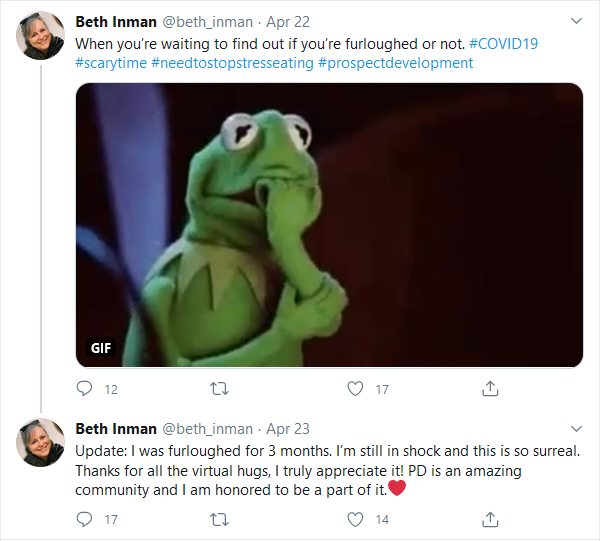I’ve been watching the nonprofit space with increasing concern lately, hearing stories of colleagues – friends – getting laid off or placed on furlough, or under the cloud of potential furlough. Considering what’s happening, I know objectively that in some cases it’s the only logical financial decision some charities can make, but it’s still a constant heartache. I know that many colleagues will come out of this just fine – or maybe even better – in the long run, but in the moment it can be hard to summon hope. That’s why I wanted to make sure you saw this article from Apra-IL’s blog written by Joan Ogwumike and Beth Inman. It’s more than just a journey story – Beth shares great perspective and practical coping techniques, too. Thank you to Joan, Beth, and Apra-IL for granting permission for your article to be re-shared here. ~Helen
Joan: Hi Beth, can you share with our readers where you believe your heart and mind is right now?
Beth: Name an emotion and I’ve felt it over the past few months. Worried, scared, angry, optimistic, hopeful, to name just a few. Right now, I’m feeling grateful and my heart and mind are in a good place considering all the changes over the past couple of months (being furloughed, long distance move, and starting a new job). I’m grateful for my fantastic new job opportunity and for our prospect development community which has been so supportive. I have received emails, texts, and dm’s checking in, and those gestures have made a huge difference in keeping my spirits high.
Thank you for mentioning the prospect development community, can you share why community matters (you state that their outreach made a huge difference in keeping your spirits high) can you share more on that?
Community matters because it’s important to have a connection. That connection could be familial, professional, spiritual, etc. but it’s that connection or being a part of something that contributes to our overall sense of wellbeing. Our prospect development community on Twitter, for example, is so interesting because I’ve only met a handful of them in person. That said, I know they’re there when I’m frustrated about our work and I also know they’re there when we’re going through something like COVID and it’s affecting all of us in some way. Even when the “there” is virtual, it’s still so helpful!
Where would you say your heart and mind were as you waited to find out your furlough status?
Some days I was sure I would be furloughed and other days, I had a glimmer of hope that the work I was doing was important enough to not be furloughed. We knew a week ahead of time that furloughs were coming but we had no idea how many staff would be affected or what criteria would be used to determine who would be impacted. That was a really long week. That level of worry is exhausting and it affects every aspect of your life.
As many are going through this exact situation, what can you say matters?
2020 has been a rough year for everyone and we have all had very different experiences related to COVID-19 and its effects on our industry, our communities, and our families. I am a planner and I am a worrier so the past 5-6 months have been really tough for me. What I’ve realized is that I spend a lot of time worrying about things I don’t have any control over and asking for help is OK. What matters to me right now is understanding that it’s alright to not have a plan and to recognize when I should ask for help – that I don’t have to do it all myself.
I believe you just spoke to so many of us who are planners and worriers, to break away from this ingrained piece of us would be difficult, how are you doing it? Is this a process or an overnight shift?
Oh, it’s definitely a process and one that I have to consciously work on! My therapist has helped me with ways to counter my worrisome thoughts when I start to go down that “what if” rabbit hole and it takes practice to do that, but it’s worth it. One of things I learned is to counter a negative thought with a positive one. This helps me think about the different ways a situation could go and options I need to consider. For example, when I was worrying with thoughts that “my house wouldn’t sell”, I flipped it and asked, “what if the house sells,” that helped me think about what I’ll need to do when it sells.
Ever since the quarantine started many have shared advice on working from home, and ways to stay busy and productive aside from their work; what did you do to keep yourself whole, sane, and happy?
For me, once I learned I was furloughed, I made a to do list and came up with a schedule (albeit a not very structured one) for the weekdays, which was really helpful. I had been working full time for 20+ years so to learn on a Thursday that I was no longer working was a really odd and scary feeling. I kept thinking, “what am I going to do?” That’s where the to do list and schedule came in. They helped me structure my day in a way that helped me stay on track and feel like I had some control over the day. My to do list was everything from clean out the pantry to exercising to reviewing my resume and even what Netflix shows I wanted to watch. When I made the schedule, I wanted to start the day doing something that made me happy which was drinking coffee and reading. (I have read a lot over the past few months and if you need any book recommendations, let me know!)
Do you have any advice for people experiencing the fear of being furloughed?
In talking to friends and colleagues about furloughs, I have learned that organizations have handled their furloughs differently. For example, some organizations continue to keep in touch with their furloughed employees; they are part of regular meetings and they are provided updates on their furlough status. This was not my experience, so my advice is to think about questions to ask your supervisor if you are furloughed. For example, how will the organization communicate with those who are furloughed? Will you have access to your files/emails/intranet (your org’s HR site, for example)? If you’re going to file for unemployment, it wouldn’t hurt to research what you will need to apply in your state so you have an idea of what to prepare. In some cases, it can take weeks for the benefits to kick in, so filing sooner rather than later is a good idea.
Now is also a good time to review your resume, cover letter, and LinkedIn profile and make sure it’s up to date. If you decide to start a job search, it’s good to have these documents in their best shape. And, if you start applying for positions, reach out to your references to confirm they’re still willing to be a reference and give them a heads up if you learn an organization is contacting your references. If you use your work email for Apra and other professional listservs, make sure you update it to your personal email to ensure you continue to get important information.
And, finally, practice self-care and utilize the Apra community! Self-care looks different for everyone but it’s so important! The Apra community is helpful and compassionate and we want to see our colleagues succeed.
Thank you again, Joan and Beth. Dear readers, do you have any advice to share? Please share in the comments .





